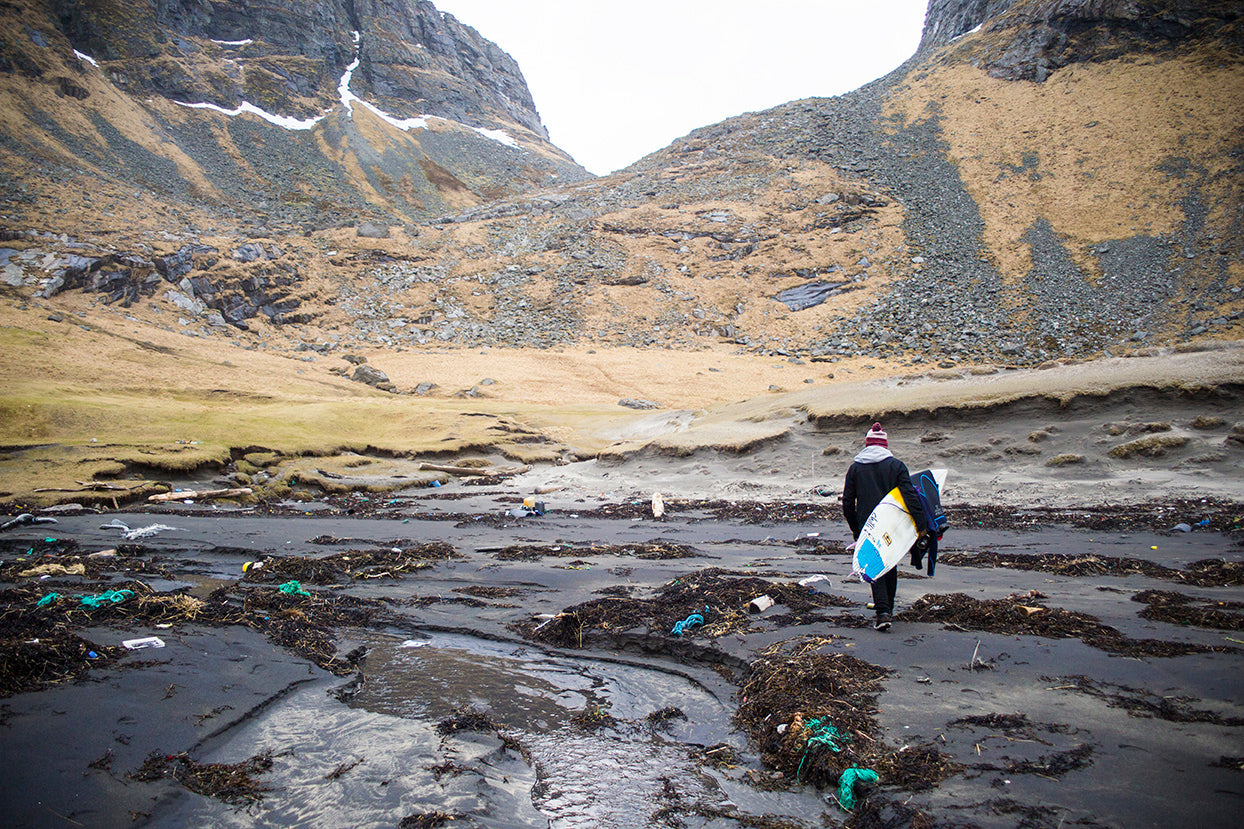Tim Nunn founder of The Plastic Project

Recently we asked our awesome community to help Tim Nunn take his inspiring talks about the rising tide of plastic waste into more schools. We had a great response. If you missed it, you can still donate here.
Tim got in touch to say thank you. This got us on to chatting about his outdoor life and the inspiring Plastic Project, so we figured we should let you in on the conversation.
Have you always been a surfer? Who lit that spark in you?

I grew up on the Norfolk Broads, I sailed a lot, I found it great, but lacked the adventure and freedom I really wanted, and simply surfing had that. It was because I knew people who surfed who got me into it.
There is a beautiful relationship a surfer has with the elements and the ocean, regardless of whether you are a sponsored ripper or a soul man, you all have this connection. Being in a position where it's just you and only you in control out there is what it's all about.
We've read about some of your surf trips, they sound an absolute blast. Can you tell us some tales you wouldn't want your mum to hear?

Probably the sketchiest tales are all about being in the sea. Swimming in heavy surf taking pictures is the bit I talk least about, but is the most dangerous. There are times when you get caught inside by big sets and get smashed around, and there are surf breaks which are nightmare to get in and out of. You have to accept some pretty brutal poundings on rock shelves which most people would consider suicidal.
But from a general all round adventure side, living alone out of all contact with civilisation in Canada, surrounded by Bears, Wolves and Mountain Lions is the most sketchiest. There were four us, two from England, two from Los Angeles, and really we learnt thing as we went along over the six weeks. Things could have gone badly wrong...
Do you have a favourite spot, or is that a closely guarded secret?
I love the beach breaks of France. They are so varied. One day can be big hollow world class barrels, the next fun air waves, the next huge tow surf waves. I love the variation, and how good it gets down there.
Our favourite creatives are those who base themselves in nature. How do the two relate in your work?

What sets surfing apart from all other activities in the action sport world is the environment and how varied it is, and so for me it is as important as the act of surfing its self, it really is that simple. The thing I love about surf photography is it encapsulates all genres of photography. You are an action photographer, a people photographer and sometime fashion photographer and always and landscape/environmental photographer, and so just naturally you're part of nature.
Tell us about your photography. Are you trying to capture anything specific?

I always try and put the viewer into the situation, whether that be the intensity of being in a barrel close up, the subtleties of an air or just showing the vastness of the environment that everything is taking place in, it has to be about making people feel something for the shot by transporting them there. I want the images to not only tell a story but make people want to get out and experience it for themselves, and thus want to protect the environment that it's all going on in.
What does your average week look like? Whats the balance between getting out there, time in the edit suite, time on the road and making a living?

I really divide my time between trips/expeditions and then home/work life. So an average week at home is a lot writing, a lot of editing, half of which is for clients within the surfing and outdoor world, half around The Plastic Project. I do quite a lot of talks, which are about the adventures, which each have an environmental twist in them.
Then when I'm on a shoot/expedition that's all I'm doing, so January and February I have been totally office based working on raising money for The Plastic Project, working on the educational programme, planning expeditions and also fitting in commercial work. Then from mid March to mid May I am going to Scotland, Iceland, Ireland and Svalbard so it becomes really focussed like that.
How did you get into campaigning? Was there a specific moment that triggered a response?

It was simple really, I've spent 18 years going to the wildest coastlines on Earth looking for surf, and trying to inspire people to get out and have adventures themselves. Doing this I've portrayed the good things about our planet, but I felt as marine litter has become more and more of an issue I couldn't ignore, and being on the front line with real photographic evidence it made sense to use that. There was a tipping point though on a remote beach inIceland four years ago where I found a McDonalds carton and Coke bottle, just sitting there, and that was the catalyst.
What have you learnt?
I've learnt that to really make a difference every person, and every level of humanity has to change. By that I mean it's as important for a person who has never been near the sea to stop using single use packaging as it is someone who lives by the coast, everybody needs to think about their consumption, and that is a difficult audience to reach, but using something that everyone can empathise with, the great outdoors and adventure gets to everyone.

Then businesses have to take on the responsibility for what they are producing, OK it may not be their fault that someone throws a bit of plastic on the ground, but if they can design that bit of plastic out of their process, they save millions of pieces of rubbish entering the environment.
Then finally I think it's the ability of young people to really grasp the need for change, they are the brains will come up with new ideas for the future.
What's been your biggest success so far?

Every time I give a talk and get through to people who haven't thought about it before, it's a big success. But our educational programme with A Tale Unfolds is huge. We're getting primary school kids to use our material to do film and writing projects and to then understand the problem.
Who else do you respect for their environmental stance?
Within the outdoor industry there are a lot of brands who really care and take a stand, it's easy to admire folks like Patagonia, I think here in the UK Finisterre have gone some way as well, and there are many more on a smaller scale as well. Then I think all individuals who make tiny changes, everyone who is doing something is someone to admire.
Any thoughts on why surfers make such effective environmental campaigners?*

I think we are immersed in our environment for long periods of time with not a lot going on, and because of that we notice things. When you actually analyse how long is spent wave riding in the average three hour session it is a tiny amount of time, probably ten minutes if its epic. So couple that with the amount of time we spend on beaches checking the surf, we notice things.
Surfer's Against Sewage sorted out sewage pollution single handedly almost and it was through nessescity almost because we were all getting ill, and now we are on the forefront of plastic pollution, and because we are exposed to it every single day, naturally we are leading the charge.
Do you think we can turn the tide?

I think we are slowing the tide, even though we have films about marine plastic, people like CNN and Sky launching campaigns, pressure groups, it only helps. It's down to individuals to sort this out.
I am strong believer that creative ways of 'selling' the environment, something which we shouldn't really need to do, but we have to, is the answer. I think beach cleaning and pressure groups are an important part of this, but it takes people being creative, and using resources like we do to reach the bigger audience. We all have to become advocates for our planet. Or we all die.
What can we all do in our everyday lives to make a difference?
Well I think it's all about eliminating single use plastic.
Not all plastic is evil. Some of it is essential in modern life, but it's the single use stuff that we do have a choice over. So no more bottled water. Get your own reusable bottle. Take a coffee cup to your favourite takeaway coffee house. Shop with people who are cutting out packaging. It's these choices that do have an affect on everything. Then tell people about it, word of mouth beats any social media campaign of legislation change. We can all be activists on a small scale.
...
Thanks Tim. Not just for the interview, but for giving a fuck. Thank you. It would have been rude to pry into your personal life, but inevitably there are sacrifices involved in devoting such energy to a campaign. Few people do it. So those that do deserve our thanks and support.
If you're looking to cut down on single use plastics, check out our range of bottles and cups from Klean Kanteen.

Picture credits:
All photography courtesy of Tim Nunn himself
